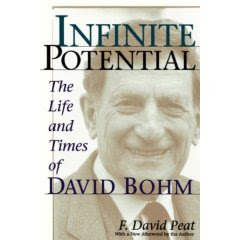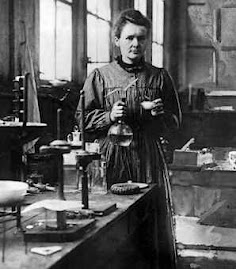The gym is not a place I associate with insight into the important spiritual or intellectual issues of our day. Nor for that matter is
Time Magazine. I had just finished my workout on the elliptical machine and was on my way to the weight room when I glanced at the magazine table in the hall and in the corner of my eye caught the cover of
Time. The cover article “
God vs. Science” got my attention. Yet it was as much the spaciousness of the cover design that held my interest.

In contrast to
Time’s usual dark and busy cover, it was a large white field mostly empty except for an uncurled DNA double helix sauntering down its length to one side. The DNA bases turned into rosary beads and the "molecule" ended up holding a cross--- but I didn't see that until later. I grabbed the magazine and brought it with me to the weight room.
The body of the article turned out to be a debate between an evolutionary biologist and a Christian geneticist.
Richard Dawkins , a well-known evolutionary biologist is virulently anti-religion: his recent book is called
The God Delusion. The geneticist,
Francis Collins, led the effort to decode the genome: his recent book is called
The Language of God: A Scientist Presents Evidence for Belief. A while back I heard
Dawkins debate a leading intelligent design proponent on NPR. I am very attached to the idea of evolution---to its power and elegance: my sympathies were certainly not with the fundamentalist. However I felt there was something lacking in the case that
Dawkins made. Evolution and a sense of a deeper purpose or meaning to existence than that of the material world are not necessarily opposed to each other. I have trouble with the concept of God, but I do believe in the reality of something beyond the material world.
Francis Collins, the geneticist argued--- as do many scientists of faith--- that the fact that the six universal or cosmological constants work out to be just what they have to be to support life indicate that the universe was the handiwork of God. Most scientists agree that if even one constant had been a little off in one direction after the Big Bang--- for example if the gravitational constant had been off by one part in 100 million million --- the expansion of the universe would not have occurred in a way that would have eventually supported life. This is called the anthropic principle.
Dawkins countered in part that this assumes that the cosmological constants are fluid rather than fixed.
"People who believe in God conclude there must have been a divine knob twiddler who twiddled the knobs of these half-dozen constants to get them exactly right. The problem is that this says, because something is vastly improbable, we need a God to explain it. But that God himself would be even more improbable. Physicists have come up with other explanations. One is to say that these six constants are not free to vary. Some unified theory will eventually show that they are as locked in as the circumference and the diameter of a circle. That reduces the odds of them all independently just happening to fit the bill."
Certainly it is difficult to imagine the divine knob twiddling. Yet much more interesting to me is the other tact he and others use to argue against the difficult to account for coincidence implied by the universal constants working out just right to support life. If there were not just one, but a very large number of universes with different cosmological constants, then finding one where everything worked out right would not be so wondrous and would not necessitate an underlying intelligence.
"The other way is the multiverse way. That says that maybe the universe we are in is one of a very large number of universes. The vast majority will not contain life because they have the wrong gravitational constant or the wrong this constant or that constant. But as the number of universes climbs, the odds mount that a tiny minority of universes will have the right fine-tuning."
In response Collins invokes Occam’s razor, saying that he finds the idea of a designer a simpler hypothesis than postulating a large number of alternative universes.
"This is an interesting choice. Barring a theoretical resolution, which I think is unlikely, you either have to say there are zillions of parallel universes out there that we can't observe at present or you have to say there was a plan. I actually find the argument of the existence of a God who did the planning more compelling than the bubbling of all these multiverses. So Occam's razor--Occam says you should choose the explanation that is most simple and straightforward--leads me more to believe in God than in the multiverse, which seems quite a stretch of the imagination."
This helps illustrate what is so often true. One person’s Occam's razor, or simpler explanation, is another person's Mount Everest--- or nearly impossible impasse. I have to say that I am with Collins on this one (though I would posit an intelligent force rather than a designer-- which is too” knob twiddling” for me). An intelligent force seems to be simpler to me than an almost infinite number of universes. Yet I'm not sure which I would think the simpler hypothesis if I didn't have sporadic experiences that support the existence of a deeper and more sophisticated force working in us and through us. My personal concept of spirituality is pretty much grounded in those brief moments in which I get hints of this larger consciousness in the cosmos.

Notice I said nearly impossible impasse above when remarking that one person's Occam's razor is another person's Mount Everest. Alas Dawkins, a scientist with a large theoretical reach---in spite of his strong antireligious bias --- does seem able to make an assent. He says,
"I accept that there may be things far grander and more incomprehensible than we can possibly imagine…My mind is open to the most wonderful range of future possibilities, which I cannot even dream about, nor can you, nor can anybody else. What I am skeptical about is the idea that whatever wonderful revelation does come in the science of the future, it will turn out to be one of the particular historical religions that people happen to have dreamed up…. If there is a God, it's going to be a whole lot bigger and a whole lot more incomprehensible than anything that any theologian of any religion has ever proposed."
Thus
Dawkins is not necessarily arguing against mystery, but just for greater mystery that can be contained in God as a historical concept. A wise not so old man I met recently, when I told him about this debate, gave me a new sense of why Jews are not supposed to say the word God. Perhaps
Annie Dillard , whose books have a strong spiritual thread (see
Oct 26), captures this best---for our unholy and minimalist age--- when she writes, “I don't know beans about God
.”
------------------------------------------------------------------------
------------------------------------------------------------------------
Paul Tallant wrote me after reading my piece that he had some thoughts about science and religion. I encouraged him to put them in writing and submit them as a comment. The result was so comprehensive and moving to me and also so parallel to what I had written in certain ways --- I decided that it fit best right afterwards. Paul's views are not exactly the same as mine, but they come close in many areas.
No Essential Difference by Paul Tallant
Acknowledgment: I am grateful to Lois Isenman for her encouragement to write this note and for her gentle and thought-provoking comments and queries as I wrote it.
I was waiting in the doctor’s office and spied a copy of the 17 July 2006 Canadian issue of
Time. The cover with a cowboy hat sporting a Presidential Seal and boots protruding beneath caught my attention initially, but my eyes rapidly shifted to one of the cover’s sub-captions; “Exclusive Einstein Letters.” I started reading Walter Isaacsons’s feature “
The Intimate Life of A. Einstein,” however my name was called before I finished (a seemingly infrequent event in the patient-waiting rooms of Canadian medicine). After my appointment, the receptionist told me I could borrow the issue. I returned home with it and placed it on my night-time reading table. At bedtime, after reading Isaacson, I discovered David Van Biema’s article “Reconciling God and Science” in the “
Religion” section of same issue of Time. Naturally I began reading Van Biema. I did not turn out the light until I had read his entire account of Francis Collins’s personal encounters with God and how Collins reconciles his work in science with his beliefs in the Divine---taken from Collin’s new book
The Language of God: A Scientist Presents Evidence for Belief. Serendipitously, Lois Isenman’s post, a doctor’s appointment, and a five-months old copy of Time provided me an opportunity to comment on a subject that, in various incarnations, has held my attention for years. I thank Lois for the opportunity to describe briefly the latest edition of my thoughts regarding God and science.
I believe in God. I believe in evolution. And I believe that those two beliefs are intrinsically harmonious. But this harmony is infrequently heard amid the crescendo of a commonly perceived dissonance between God and science. It is the perceived dissonance that likely led Van Biema to title his piece “Reconciling ---” and similarly for Lois to title her’s “--- Bridging –“
I grew up with beliefs far more conservative than those of Collins. Early-on I believed in a “young” Earth, and essentially accepted the Genesis story as an account of Divine science. But Collins does not take that tack and is quite clear in his view about the Genesis account. He says “I don’t think God intended Genesis to teach science.” I now agree with Collins.
Collins’s approach to spirituality was different than mine. Collins was hiking in the Pacific Cascades and encountered a frozen waterfall with the shape of three distinct streams. From those frozen forms Collins recognized the Trinity and surrendered to Jesus Christ. My hike was figurative. It seemed that on a thickly-clouded night I was deep in the Barrens of the Avalon Peninsula, Newfoundland Canada, seeking to return to the only road that led back home to Witless Bay, a small ex-fishing community near St. John’s. I was lost. But out of the darkness appeared a woman who was studying to be a rabbi. She handed me a copy of
Minyan, Ten Principles for Living a Life of Integrity by
Rabbi M. Shapiro and said “read it.” I did.
Rabbi Shapiro’s account of the foundation of spirituality is strongly credible to me because he is a Jewish Rabbi who has moved spiritually beyond both his Orthodox upbringing and the Reform rabbinical training he received. In “Minyan –“ Shapiro gives a moving account of his experience as a rabbinic student. Shapiro says:
“I delivered a sermon on the necessary unity of God, woman, man and nature. Immediately after the service I was called into the office of the chairman of the philosophy department for a scholarly reprimand.”
“Referring to my position that God and creation are one, the chairman said; ‘You sir are a megalomaniac.’”
“”With all due respect, Rabbi,’ I said, you are wrong. If I understand the term correctly, a megalomaniac thinks he is God. I, on the other hand, know I am God.’”
“What I meant to convey and doubt very much that I did, was my deep conviction that God is not something or someone living somewhere in or out of time and space. To me God is the One who manifests as all things in time an space. God is not something you pray to, but rather the greater reality to which you awake.” (Italics mine.)
Rabbi Shapiro’s approach to spirituality is in a sense similar to Collins avowing a belief in God and concurrently possessing acknowledged stature in molecular genetics. Shapiro moved beyond the traditions of his cloth and Collins embraced a spiritual belief not common among his scientific peers. I take the essence of Shapiro’s thesis to be that God dwells within each of us, is indescribable, is Love, and is accessible through the exercise of our own free will.
The lady with the book provided the way for me to figuratively return to the road and civilization. I believe in God and further believe that God dwells within me, and within every human being. I spent years wondering about the nature of God, feeling almost a compulsion to discover the nature of God. Lois comments about the deeper meaning of the Jewish concept of God being indescribable and un-nameable. That now is my view of God, perhaps not in the strict Jewish sense, but I recognize that neither I nor any other human can possibly define God, other than to deny God’s existence – and that is a thread-bare definition. I am now content to believe that as part of God being God, the Divine dwells within each of us. And I leave the huge remainder to God alone.
Francis Collins, when viewing the frozen waterfall, surrendered to Jesus Christ. After absorbing more of Minyan -- and the works of other thoughtful writers (for example see
Williamson ,
Welwood ,
Walsch) I surrendered to God Within, to Love Within. In the broad theme of the Divine, I believe there is no essential difference between Collins’s experience and mine (and that of zillions of other spiritually inclined people)--- what difference there is lies in human viewpoints. I believe further that there exists a perspective that presents these seemingly different views of God as a single Wholeness.
The notion of “no essential difference” applies also to my belief about a “gap” between science and religion, or the need to “reconcile” God and science. Within the broad theme of the Divine, I believe that there is no difference, no gap, and no need for reconciliation. I believe that nature is an explicit revelation of God and that science is the tool available to us humans to learn of the “testable” part of the Divine.
Lois quotes Richard Dawkins as saying, "I accept that there may be things far grander and more incomprehensible than we can possibly imagine…” She also quotes Annie Dillard as saying, “I don't know beans about God.” Van Biema describes an exchange between Collins and a Ph.D. candidate at a meeting of Harvey Fellows in Alexandria Virginia. The student asked Collins if he felt that evolution applied to everything else but humans. Collins responded that such a position would get you into real trouble. Collins also said “the human genome contains nonfunctional elements in the precise spot where they can be found on chromosomes of lower animals.” Then Collins asked a question and provided his own answer. “If God was creating humans afresh, why would He insert a pseudo-gene that has lost its ability to do anything in the same place that it appears in a chimp? “ Collins continued “Barring evolution, you are forced to the conclusion that God was trying to mislead us and test our faith and I have trouble with that kind of conjecture.”
Physicists have long recognized the extreme sensitivity of the nature of our Universe to the value of fundamental physical constants. From the Big Bang on, very slight changes in one or more of these constants would have resulted in a dramatically different Universe than what we observe today. And as Lois describes, argument and controversy in the context of God swirls about the origin of the value of these constants.
In graduate school one of the most important things I learned about representing physical phenomena is to use a coordinate system that is intrinsically appropriate to the process itself. For example, if a process inherently has spherical geometry, don’t describe it or cast it in Cartesian coordinates; you’ll only create a symbolic mess for yourself. On a more abstract level, a coordinate system is simply a formality through which details of phenomena can be visualized. It is a perspective through which to view the behavior of a process or system.
Personally, I take the approach of choosing the appropriate “coordinate system”, the appropriate perspective to solving the issue of God and science. If you do not believe in God, then you have the “trivial” solution; there is only science and no need to look further. But if with me you admit the existence of God, then I believe we require a figurative “coordinate system,” a yet undiscovered and undefined perspective, a point-of-view, that will allow the “problem” of God and science to be resolved with efficacy and integrity.
This perspective must deal with both the spiritual and the physical. The spiritual requires faith, the physical intrinsically does not; it is “testable.” With Annie Dillard, I don’t know “beans about God.” But I believe that God exists and I believe with Rabbi Shapiro that the Divine dwells within me and within each of us humans. I further believe with Collins that DNA is a “language of God,” that evolution exists and that it has been and continues to be active in our world. I also believe with Richard Dawkins that “—there may be things far grander and more incomprehensible than we can possibly imagine –.” I further believe that a perspective exists that contains an elegant and non-trivial solution to the issue of God and science. And finally, when viewed via this perspective, I believe we will discover that the solution contains no essential difference between God and science.
 In my initial post back in October, Things Are Not As They Seem, I wrote how glad I was to hear an NPR commentator resist the urge to say in ‘a blink of the eye’ and say ‘in a flash’ instead. Alas yesterday another NPR reporter, I am sad to say, did not resist the urge. Beside the fact that I first published the idiom as a metaphor for unconscious cognition and intuition in 1997, I dislike the trendiness of the phrase. But it seems like I’d better settle in for a much longer run for the distressingly facile use of this my adopted intuitive soul child. Apparently Blink is being made into a movie---or so the scuttlebutt on the web claims.
In my initial post back in October, Things Are Not As They Seem, I wrote how glad I was to hear an NPR commentator resist the urge to say in ‘a blink of the eye’ and say ‘in a flash’ instead. Alas yesterday another NPR reporter, I am sad to say, did not resist the urge. Beside the fact that I first published the idiom as a metaphor for unconscious cognition and intuition in 1997, I dislike the trendiness of the phrase. But it seems like I’d better settle in for a much longer run for the distressingly facile use of this my adopted intuitive soul child. Apparently Blink is being made into a movie---or so the scuttlebutt on the web claims.

 Also imagine Annie Dillard as narrator, and my favorite palentologist/theologian Teilhard de Chardin ( played by George Clooney of course) weaving in and out. That is Teilhard to the left. Finally imagine cameo appearances by Isaac Luria, Simone Wein, and many of the other deeply feeling and colorful theological thinkers of the ages.
Also imagine Annie Dillard as narrator, and my favorite palentologist/theologian Teilhard de Chardin ( played by George Clooney of course) weaving in and out. That is Teilhard to the left. Finally imagine cameo appearances by Isaac Luria, Simone Wein, and many of the other deeply feeling and colorful theological thinkers of the ages.















